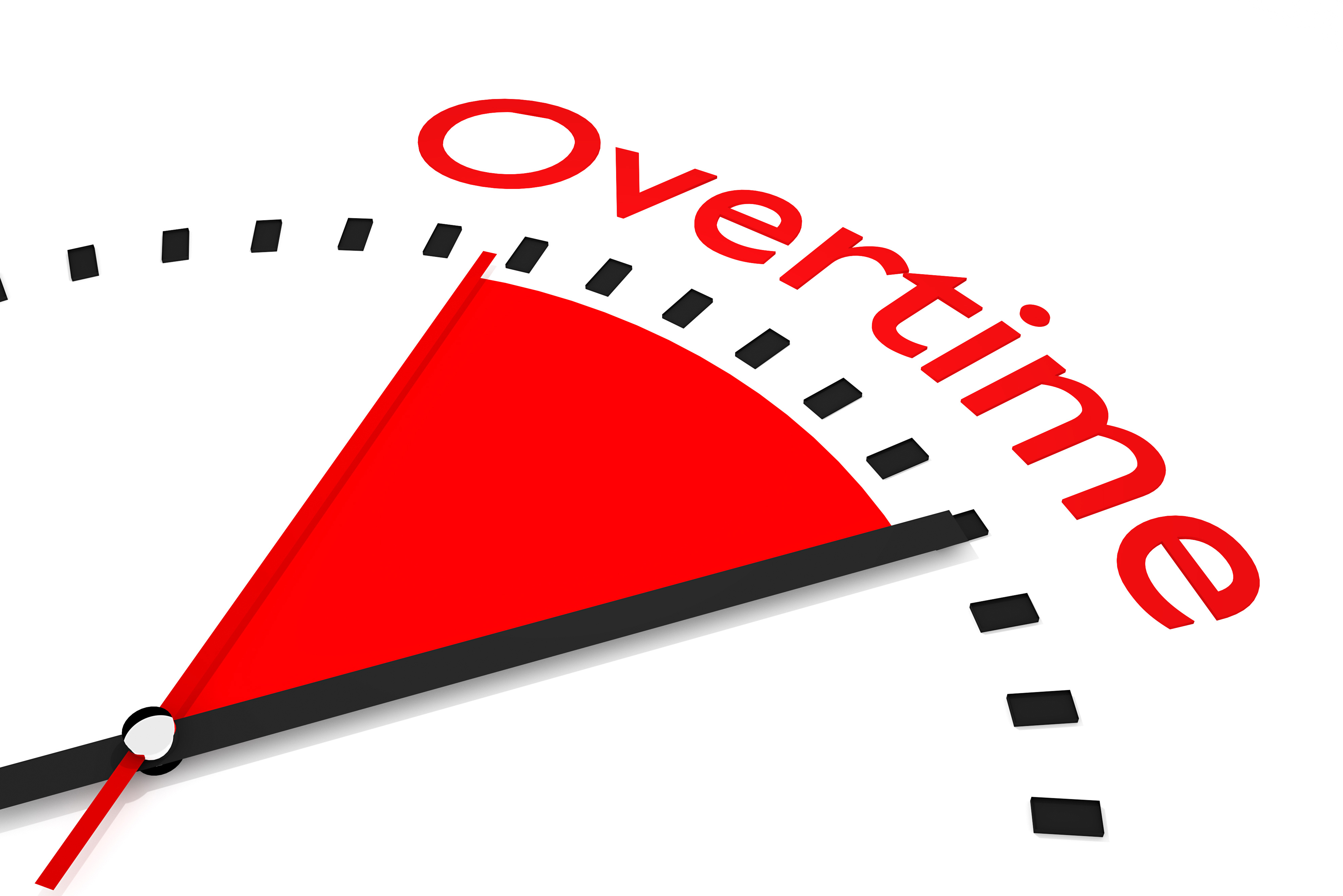It's almost as if some search terms can lead us down a few different paths, and today, we're going to explore one that's really important for many working people: the concept of overtime. While a search for "overtime megan leaked nudes" might bring up a variety of results, our focus here is squarely on the crucial aspects of working extra hours and making sure you get paid fairly for your time. This article is all about helping you grasp the ins and outs of overtime rules, ensuring you're well-informed about your rights and what you're owed when you put in those extra shifts.
So, we're going to talk about what overtime truly means in the workplace. It's not just about putting in a few extra hours; it's about a specific set of rules and regulations that protect workers and ensure they receive proper compensation for their efforts beyond standard work hours. We'll look at the different kinds of jobs that qualify for this extra pay and some that might be exempt, which is actually quite common.
This discussion will cover how overtime is figured out, what a "workweek" really means in the eyes of the law, and even some newer changes that could mean more money in your pocket, like certain tax savings. It's a bit like navigating a system, but knowing these details can make a big difference in your financial well-being. We'll also touch on specific state laws, like those in New York, to give you a clearer picture of what to expect.
Table of Contents
- Understanding Overtime Pay: What It Means for You
- Who Gets Overtime? Eligibility and Exemptions
- Calculating Your Overtime Pay
- The Workweek: Defining Overtime Hours
- Recent Changes: Tax Savings on Overtime
- Protecting Your Rights: New York Overtime Laws
- Common Questions About Overtime
- Fair Compensation: Why Overtime Matters
For clarity, this article focuses on general labor law principles related to overtime. It does not pertain to any specific individual or their personal details, so a biography or personal data table is not applicable here.
Understanding Overtime Pay: What It Means for You
Overtime pay, in a very real sense, is a way to make sure people are properly rewarded for working beyond their typical schedule. It's usually paid for services performed in excess of 40 hours during a standard workweek, though for some residential employees, that threshold is slightly different, often kicking in after 44 hours. This means if you're putting in those extra shifts, you're entitled to a higher rate for that time. It's a pretty straightforward concept, but the details can sometimes be a little tricky to sort out, you know?
The standard rate for overtime is generally one and a half times your regular rate of pay. So, if you usually make $10 an hour, your overtime rate would be $15 an hour. This extra pay is designed to compensate you for the added effort and time you're dedicating to your job, which is a pretty fair deal, most would agree. It's not just a bonus; it's a legal requirement for many types of work.
For instance, if you're eligible for overtime and you work 45 hours in a week, your employer must pay you at that higher overtime rate for those 5 extra hours. This applies whether you're working on a big project that needs to be finished quickly or just covering for a colleague. It's all about making sure your time is valued, and that's actually a pretty important part of worker protection.
Who Gets Overtime? Eligibility and Exemptions
Now, not everyone qualifies for overtime pay, and this is where things can get a little nuanced. Some occupations are exempt from overtime rules, which means that even if you work more than 40 hours, you might not receive that higher rate. These exemptions typically apply to certain types of salaried employees, often those in executive, administrative, or professional roles, or sometimes outside sales personnel. It's a bit of a common point of confusion for many workers, so it's good to be aware.
For example, a high-level manager who earns a salary might be considered exempt, even if they work 60 hours in a week. Their compensation structure is simply different, usually based on their overall responsibilities rather than hourly work. However, many hourly workers, especially those in manufacturing, retail, or service industries, are usually eligible. It really depends on the specific nature of your job duties and how you're paid, you know?
It's important to remember that just because someone is paid a salary doesn't automatically make them exempt. There are specific tests that employers must meet regarding duties and salary level for an employee to truly be considered exempt. If these tests aren't met, even a salaried employee could be entitled to overtime pay. This is a pretty significant detail that sometimes gets overlooked.
Calculating Your Overtime Pay
Figuring out your overtime pay can be pretty straightforward once you know your regular rate and the number of extra hours you've put in. As mentioned, the standard overtime rate is 1.5 times your regular hourly wage. So, if you're earning $20 an hour, your overtime rate would be $30 an hour. It's a simple multiplication, but it makes a real difference in your paycheck, doesn't it?
Let's say you work 48 hours in a week. The first 40 hours would be paid at your regular rate. The remaining 8 hours would be paid at your overtime rate. So, if your regular rate is $20, those 8 hours would earn you $240 ($30 x 8). This is how employers are supposed to calculate it, making sure you get what you're due for that extra effort. It's a fairly basic calculation, but sometimes people don't realize how much it adds up.
The Department of Labor, you know, actually provides an overtime pay calculator that can help you estimate how much overtime pay you should be receiving. This can be a really helpful tool for workers who want to double-check their paychecks or just get a clearer picture of their potential earnings. It's a good way to stay informed and make sure everything is adding up correctly.
The Workweek: Defining Overtime Hours
The concept of a "workweek" is actually quite central to understanding overtime. A workweek doesn't have to coincide with the calendar week, like Sunday to Saturday. It may begin any day of the week, but once it's set, it usually stays consistent. This means your employer defines a recurring 7-day period, and all hours worked within that specific period are counted towards your overtime calculation. It's a fairly important detail to keep in mind, as it affects when your overtime hours start accumulating.
For example, a workweek might start on Wednesday and end on Tuesday. If you work 45 hours between Wednesday and Tuesday, those 5 hours over 40 would count as overtime, regardless of when they fell within the calendar week. This consistent 7-day cycle is what employers use to track your hours and determine if you've crossed the threshold for overtime pay. It's a pretty standard practice, you know?
Once a workweek is established, it's generally not supposed to change frequently just to avoid paying overtime. This stability provides a clear framework for both employees and employers to track hours and ensure compliance with labor laws. It's about having a predictable system, which is actually quite helpful for planning your time and understanding your pay.
Recent Changes: Tax Savings on Overtime
There have been some interesting developments regarding overtime pay, particularly concerning tax implications. New "no tax on overtime" legislation, for instance, offers significant tax savings for healthcare workers and others who regularly work overtime. This is a pretty big deal, as it means more of that hard-earned overtime money stays in your pocket rather than going to taxes. It's a welcome change for many, to be sure.
One notable example is the "One Big Beautiful Bill" (OBBB), which was signed by President Trump on July 4, 2025. This bill, you know, allows workers (subject to certain dollar and income limitations) to deduct their overtime earnings on their U.S. tax returns. This kind of legislation can provide a real financial boost, making those extra hours even more rewarding. It's a pretty forward-thinking approach to worker compensation, many would say.
These types of legislative changes highlight a growing recognition of the value of overtime work and the need to support those who put in extra effort. For someone who consistently works beyond 40 hours, these tax savings can add up to a substantial amount over the year. It's definitely something to look into if you're regularly working overtime, as it could mean a better financial outcome for you.
Protecting Your Rights: New York Overtime Laws
Understanding specific state laws, like New York overtime laws, is pretty important for ensuring fair compensation and compliance. New York has its own set of rules regarding worker classification, pay calculations, and legal protections. These laws are designed to safeguard employees and make sure they receive what they're due, which is actually quite reassuring for workers in the state.
For example, New York laws specify who is eligible for overtime, how it should be calculated, and what constitutes a workweek. They also address issues like minimum wage and when overtime must be paid. These details can differ from federal guidelines or laws in other states, so it's really important to know the specifics for where you work. It's like having a local guide for your rights, you know?
If you're working in New York, taking the time to understand these regulations can prevent misunderstandings and ensure your employer is following the law. It's about being an informed employee, and that knowledge can empower you to advocate for yourself if needed. There are resources available to help you understand these laws better, which is pretty helpful.
Common Questions About Overtime
Many people have questions about overtime, and it's understandable, given the complexities. Here are a few common ones that often come up:
1. Does my employer have to pay me overtime if I work more than 8 hours in a day?
Not necessarily. Federal law, and many state laws, generally base overtime on hours worked over 40 in a workweek, not on a daily basis. Some states do have daily overtime laws, but it's not universal. So, you might work 10 hours one day but only 35 for the week, and in that case, you wouldn't get overtime. It's really about the total hours in that defined workweek, you know?
2. Can my employer make me work overtime?
In most cases, yes, your employer can require you to work overtime, as long as it's within legal limits and doesn't violate any employment contracts or collective bargaining agreements. Refusing to work required overtime could lead to disciplinary action, including termination. It's a pretty common expectation in many jobs, especially when there's a lot of work to be done.
3. What if my employer doesn't pay me overtime?
If you believe your employer is not paying you the overtime you're owed, you have legal options. You can file a complaint with your state's Department of Labor or the federal Department of Labor. Keeping good records of your hours worked can be very helpful in these situations. It's important to know that you have recourse if your rights are not being respected, which is a pretty fundamental protection.
Fair Compensation: Why Overtime Matters
Overtime pay is more than just a higher hourly rate; it's a fundamental aspect of fair compensation and worker protection. It acknowledges the extra effort and time you dedicate to your job, which is pretty important. When people complain, they often say "OT" for overtime, and it's a clear sign of the additional work being put in. The payment for this can be called an "overtime fee" or "overtime payment," showing its distinct value.
For instance, the phrase "work overtime" is widely understood in the business world, especially in international companies. Factory workers, you know, often use the term "OT" daily when discussing their schedules. It's a shared understanding that going beyond the standard hours means a different kind of commitment, and therefore, a different kind of pay.
In a very real way, overtime rules help ensure that businesses don't simply overwork their employees without proper remuneration. It encourages employers to manage workloads effectively and recognize the cost of extended hours. This balance is crucial for a healthy work environment and for making sure that workers are not exploited. It's a pretty vital part of modern labor practices.
When you're asked, "Can you accept overtime?" your answer often reflects your willingness to go the extra mile. A good response might be: "Work can bring me a great deal of satisfaction, and I really understand that sometimes clients have unexpected work requirements. I'm willing to dedicate extra time to complete tasks for our clients." This shows flexibility and commitment, which are pretty valuable traits in any job. It also highlights that working overtime is often about meeting client needs or project deadlines, rather than just routine work.
This commitment to fair pay for extra work is actually a cornerstone of labor laws, reflecting the idea that every hour worked has a specific value, and that value increases when you go beyond the standard. It helps maintain a sense of equity in the workplace, which is pretty important for morale and productivity. Learn more about overtime regulations on our site, and for specific state information, you can link to this page New York Overtime Laws.



Detail Author:
- Name : Mrs. Vesta Mayert
- Username : ryann36
- Email : aracely39@hotmail.com
- Birthdate : 1994-07-22
- Address : 9996 D'Amore Islands Apt. 793 East Adah, NM 29284-7910
- Phone : +16517663742
- Company : Aufderhar Ltd
- Job : Pharmacy Aide
- Bio : Fugiat ea vel numquam est sed dicta. Est vitae numquam accusamus. Sit error asperiores nobis quis corrupti.
Socials
facebook:
- url : https://facebook.com/shanahans
- username : shanahans
- bio : Ut dolorem consequatur libero deleniti.
- followers : 2072
- following : 1298
tiktok:
- url : https://tiktok.com/@shanahan1979
- username : shanahan1979
- bio : Dolores et ex voluptas. Repellat est placeat quia quasi voluptates.
- followers : 1698
- following : 2861
twitter:
- url : https://twitter.com/shanahan2025
- username : shanahan2025
- bio : Nemo voluptas maiores minima laboriosam accusantium unde. Voluptate eum exercitationem enim sunt et ut. Nostrum id consequatur et officia.
- followers : 1461
- following : 1513
instagram:
- url : https://instagram.com/sshanahan
- username : sshanahan
- bio : Qui ut dolores quia qui nemo eum laborum. Eum quidem fuga sit qui vero dolores et.
- followers : 1387
- following : 2405
linkedin:
- url : https://linkedin.com/in/santa_shanahan
- username : santa_shanahan
- bio : Ducimus sed eos voluptate odio nulla.
- followers : 2686
- following : 1535

